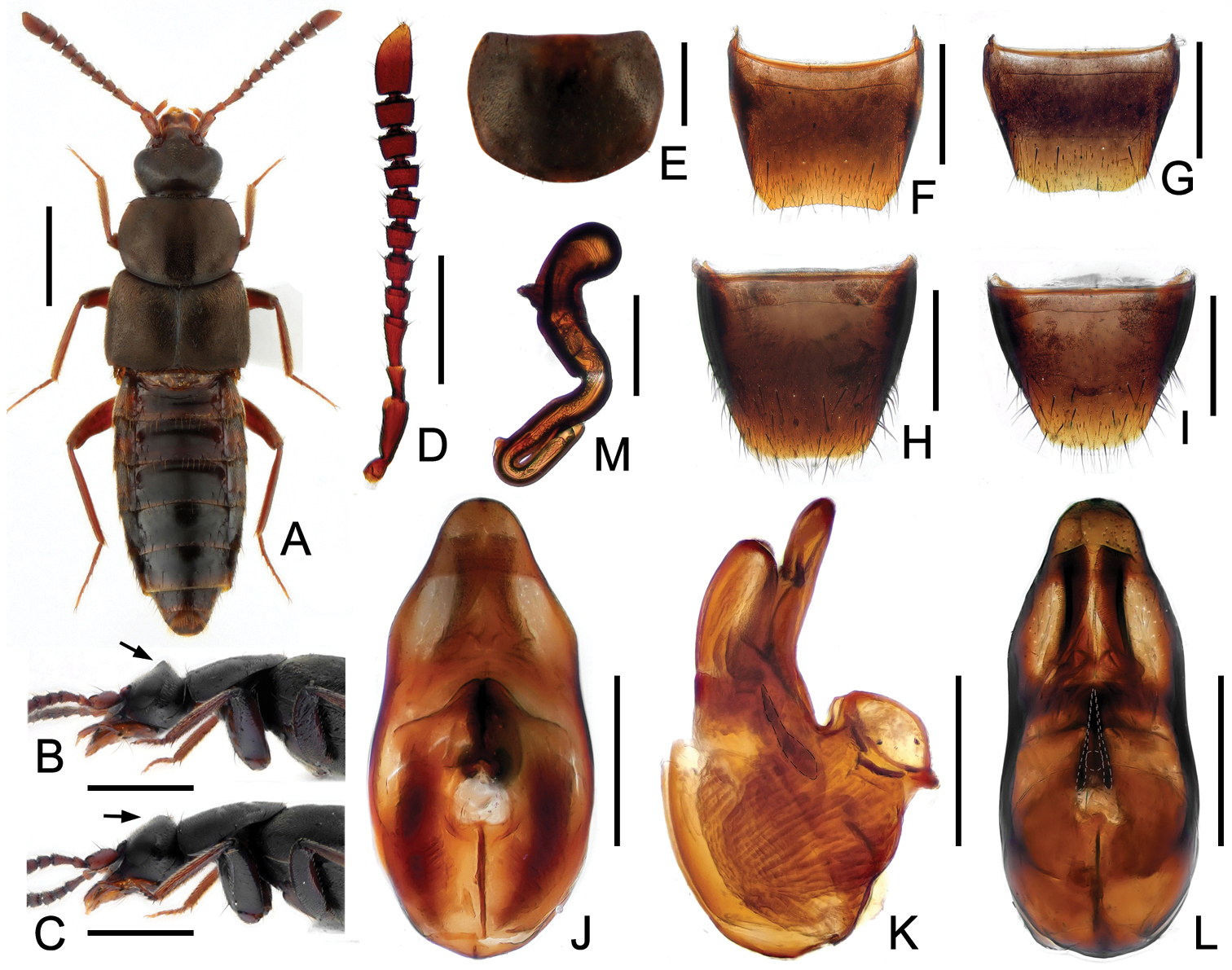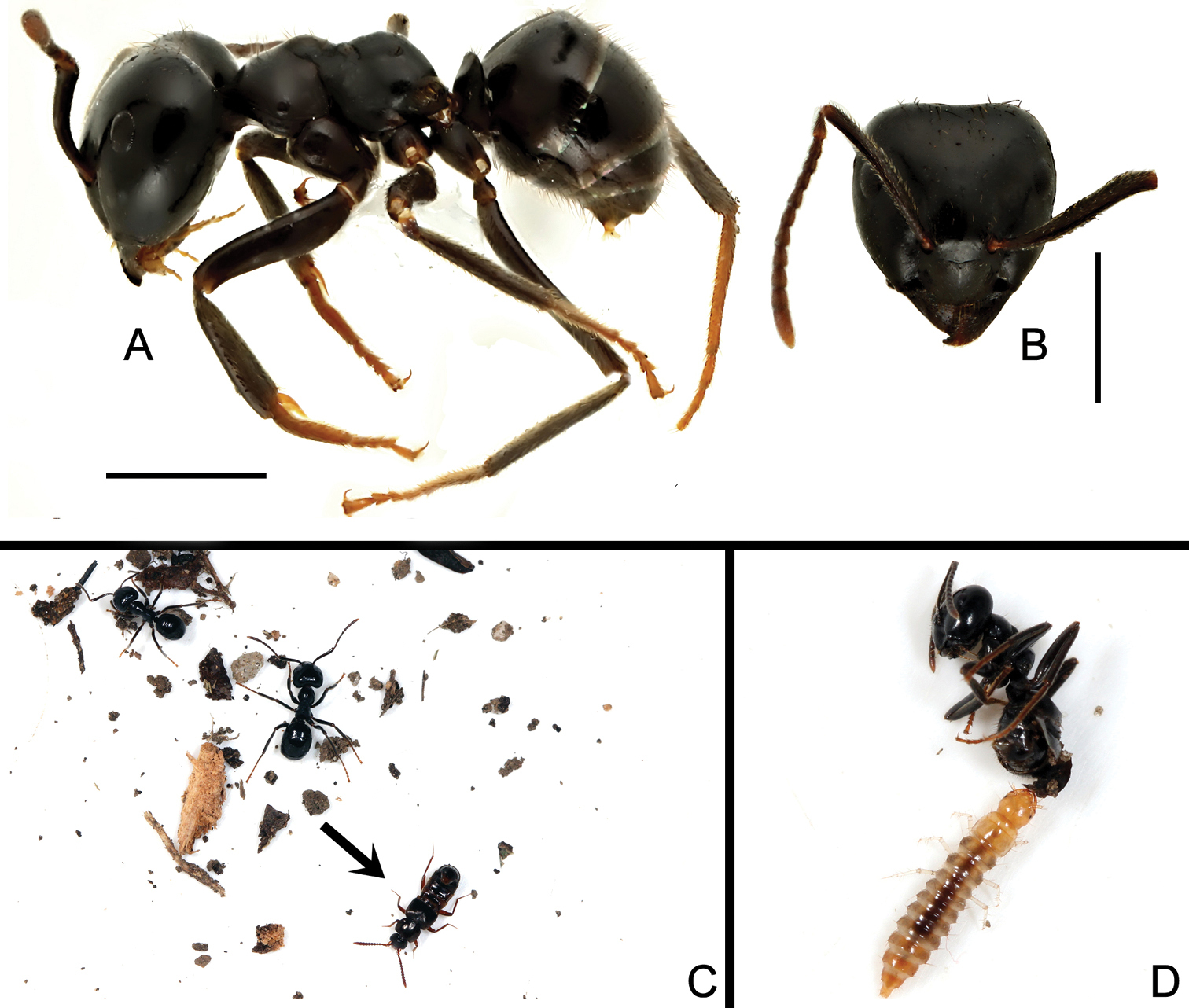






(C) 2013 Xiao-Bin Song. This is an open access article distributed under the terms of the Creative Commons Attribution License 3.0 (CC-BY), which permits unrestricted use, distribution, and reproduction in any medium, provided the original author and source are credited.
For reference, use of the paginated PDF or printed version of this article is recommended.
Pellamaoershanensis Song & Li, sp. n., collected from a colony of Lasius (Dendrolasius) spathepus in Maoershan Natural Reserve, Guangxi, is diagnosed, described and illustrated. The discovery represents the first record of the genus in South China.
Coleoptera, Staphylinidae, Aleocharinae, Pella, South China, myrmecophilous
According to the latest catalogue of Lomechusini (
Specimens were killed with ethyl acetate and preserved in 75% ethanol before dissection;
Photos of habitus were taken with a Canon EOS 50D with an MP-E 65mm Macro Photo Lens.
Head length was measured from the clypeal anterior margin to the occipital constriction; elytral length at the suture from the apex of the scutellum to the elytral posterior margin.
All the types were deposited in the Insect Collection of Shanghai Normal University, Shanghai, China (SNUC).
urn:lsid:zoobank.org:act:C88CD3B9-6194-4FF7-8EB3-96EE761E35E4
http://species-id.net/wiki/Pella_maoershanensis
Fig. 1(24 ♂♂, 28 ♀♀). Holotype: ♂, labeled ‘25°53'03.51"N, 110°29'15.67"E / Maoer shan / (1, 150 m). Xingan County / Guilin City / [Guangxi, China] / 24.VII.2012, Song X-B & Hu J-Y // HOLOTYPE [red] / Pella maoershanensis sp. n. / Song & Li / det. 2013, SNUC’. Paratypes: 23 ♂♂, 28 ♀♀, same label data as holotype, all bearing the following label: ‘PARATYPE [yellow] / Pella maoershanensis sp. n. / Song & Li / det. 2013, SNUC’.
Pella maoershanensis shares with Pella puetzi a similar form of male sexual character on the head (
Body (Fig. 1A) length: 5.5–5.8 mm. Coloration: fore body brownish; abdomen blackish, with the posterior margins of the segments reddish-brown; leg and antennae reddish-brown.
Head (Fig. 1A) almost 1.2 times as wide as long; widest just behind eyes; surface finely reticulate, covered with short golden setae. Antennae (Fig. 1D) about 2.2 mm long, shorter than head, pronotum and elytra combined; antennomeres VI–X distinctly transverse. Pronotum (Fig. 1E) 1.35 times as wide as long and 1.37 times as wide as head; widest around anterior third, narrowed posteriorly; posterior margin almost rounded; covered with short golden setae, with six macrosetae; hypomera fully visible in lateral view. Elytra (Fig. 1A) about 1.9 times as long as pronotum; covered with short golden setae; humeral angle with one macrosetae. Hind wings fully developed. Abdomen (Fig. 1A) widest at segments IV–V; surface with transverse microsculpture.
Male. Posterior margin of head distinctly angled at middle (Fig. 1B); posterior margin of tergite VIII broadly concave and finely crenulate (Fig. 1F); posterior margin of sternite VIII (Fig. 1H) almost truncate; median lobe of aedeagus as in Figs 1J–L.
Female. Posterior margin of head indistinctly angled at middle (Fig. 1C); tergite VIII (Fig. 1G) and sternite VIII (Fig. 1I) distinctly shorter than that of male; spermatheca as in Fig. 1M.
Lasius (Dendrolasius) spathepus (det. by M. Maruyama) (Figs 2A, B).
Species of Pella are usually observed walking around the host’s nest but never appear in it (Maruyama 2006). All individuals of the new species, plus three other aleocharine species were taken by sifting mixed leaf litter around the ant nest (Fig. 2C). Three possible larvae of the new species were taken back to the lab, and were observed to feed on a dead worker of the host ant (Fig. 2D). It’s worth a note that two males and a female of an undescribed Dendrolasiophilus Nomura species (Yin pers. comm.) were directly collected from the deep site of the nest.
Named after the type locality.
Pella maoershanensis. A Dorsal habitus B Head and pronotum in lateral view, male C Head and pronotum in lateral view, female D Antenna E Pronotum F Male tergite VIII G Female tergite VIII H Male sternite VIII I Female sternite VIII J aedeagus, in ventral view K same, in lateral view L same, in dorsal view M Spermatheca. Scales (mm): A = 2; B, C = 1; D = 0.25; E, F, G, H, I = 0.5; J, K, L = 0.3; M = 0.2.
A Host ant, habitus in lateral view B Same, anterior view of head C A living species of Pella maoershanensis with host antsD A possible larva of Pella maoershanensis feeding on a dead worker of host ant. Scales (mm): A, B = 1.
We thank Zi-Wei Yin (Shanghai, China) for critical comments on a previous draft. Munetoshi Maruyama (Fukuoka, Japan) helped with the identification of the host ant. We thank Munetoshi Maruyama and an anonymous reviewer for the critical comments on the manuscript. This study is supported by the National Science Foundation of China (No. 31172134) and Shanghai Normal University (Sk201242).

